‘We made it’: Ramy Shaath arrives in France after Egypt release

Egyptian-Palestinian activist says he is ‘overwhelmed, excited’ at being freed after spending two–and-a-half years in detention.
Egyptian-Palestinian activist Ramy Shaath has arrived in France after spending more than 900 days in detention in Egypt.
Shaath, who co-founded the Egyptian chapter of the pro-Palestine Boycott, Divestment and Sanctions movement, arrived in the French capital, Paris, on Saturday.
His family said Egyptian authorities forced him to renounce his Egyptian nationality as a precondition for his release.
Shaath walked out of the Paris’s Charles de Gaulle Airport with his French wife, Celine Lebrun, on Saturday to cheers and shouts of “Welcome!”
“We made it!” the activist, now free, said.
“It’s a bit overwhelming, I’m very excited to be here,” he told reporters.
“I spent the last two-and-a-half years in between a few prisons, a few forced disappearance spots, some of them underground, some of them solely, some of them with huge numbers of people in a very inhumane way of treatment, in a very challenging way of living” he said.
Ramy Shaath, (left), holds up the arm of his wife Celine Lebrun-Shaath as he arrives at Roissy airport in Roissy, outside Paris, on January 8, 2022 [Julien de Rosa/ AFP]
“I still have all my resolve, and my determination to continue,” he said, calling for the release of his “friends and comrades” still in Egyptian detention.
“I am insisting on human rights in Egypt. I am insisting on a free Palestine, I am insisting this will continue and they will not stop us.”
Première déclaration de Ramy Shaath aux côtés de son épouse @CelineLST, enfin réunis après 30 mois de séparation.#RamyIsFree pic.twitter.com/CTWcCbxwDl — Amnesty International France (@amnestyfrance) January 8, 2022
The 48-year-old is the son of veteran Palestinian politician Nabil Shaath and was arrested in Egypt in June 2019 on charges of aiding a “terrorist organisation”.
His arrest came amid a continuing crackdown on political dissent under President Abdel Fattah el-Sisi.
Shaath was released on Thursday evening.
Egyptian authorities later handed him over to a representative of the Palestinian Authority at Cairo airport, where he took a flight to Amman, the Jordanian capital, before heading onward to Paris.
‘Happy outcome’
His family said in a statement that they were “relieved and overjoyed” at his release after 900 days of “arbitrary detention” by the Egyptians.
But “we regret that they forced Ramy to renounce his Egyptian citizenship as a precondition for his release that should have been unconditional after two and a half years of unjust detention under inhumane conditions”.
“No one should have to choose between their freedom and their citizenship,” they said.
French President Emmanuel Macron on Twitter saluted Egypt’s decision to free Shaath.
“I share the relief of his wife,” he wrote.
“Thank you to everyone who has played a positive role in this happy outcome.”
In December, five human rights groups had called on Macron to pressure Egypt to release Shaath.
Macron had previously said he had brought up Shaath’s case with el-Sisi, but said at the time that human rights would not be a condition for economic and military ties with Egypt.
Ramy Kamel also freed
Separately on Saturday, the family of Ramy Kamel, a Coptic rights activist who spent more than two years in pre-trial detention in Egypt, announced he had been released as well.
“Rami is among his family… time to celebrate!” his sister Bossi Kamel wrote on Facebook.
Coptic rights activist Ramy Kamel was released on Saturday by the State Security Prosecution after being held for over two years in remand detention on terrorism charges, lawyer Hoda Nasrallah told Mada Masr. pic.twitter.com/u9H0xe0Zy4 — Mada Masr مدى مصر (@MadaMasr) January 8, 2022
Kamel is a founding member of the Maspero Youth Union, a Coptic human rights organisation born in the wake of the 2011 protests.
He was accused of joining a “terror group”, receiving foreign funding and broadcasting false information.
But in a November 2021 report, the United States Commission on International Religious Freedom (USCIRF) said his arrest “likely represented an effort to prevent him from speaking on the rights of Egyptian minorities at a United Nations conference in Geneva days after his arrest”.
Egypt’s space for dissent has been severely restricted since el-Sisi took office in 2014.
Rights groups say Egypt is holding some 60,000 political prisoners, many facing brutal conditions and overcrowded cells.
Egypt ranks in the lowest group on the Global Public Policy Institute’s Academic Freedom Index.






